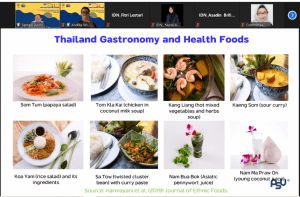 The last day of the 3rd Summer Course of Local Indigenous Functional Food’s Roles in the Era of Covid-19 Pandemic: From Farm to Table was held on July 23rd, 2021. The first session was delivered by Assoc. Prof. Dr. Santad Wichienchot, Ph.D. from Prince of Songkla University about “Influence of Functional Foods on Gut Microbiota”. Prof. Santad explained about functional foods and functional ingredients, gut microbiota, probiotics and prebiotics, and gastronomy.
The last day of the 3rd Summer Course of Local Indigenous Functional Food’s Roles in the Era of Covid-19 Pandemic: From Farm to Table was held on July 23rd, 2021. The first session was delivered by Assoc. Prof. Dr. Santad Wichienchot, Ph.D. from Prince of Songkla University about “Influence of Functional Foods on Gut Microbiota”. Prof. Santad explained about functional foods and functional ingredients, gut microbiota, probiotics and prebiotics, and gastronomy.
In addition, the session was continued by watching the recorded presentation from the group projects. The presentations were about “Golden Milk” from Group 1, “Seaweed Crispy” from Group 2, “Butterfly Pea Tea” from Group 3, “Marine Collagen Peptide” from Group 4, “Greek Yoghurt” from Group 5, “Black Garlic” from Group 6, “Butterfly Pea Yogurt” from Group 7, and “Flavoured Kombucha” from Group 8.
After finished all of the activities, the closing ceremony was held at 2.30 p.m. local time (GMT +7). The closing ceremony of the 3rd Summer Course was attended by the Dean of the Faculty of Agricultural Technology, the representative of the Office of International Affairs, Universitas Gadjah Mada, the lecturers, and the participants. The closing remarks were given by the chairperson, Dr. Arima Diah Setiowati, the Dean of the Faculty of Agricultural Technology, Prof. Eni Harmayani, and the representative of Office of International Affairs, Universitas Gadjah Mada, I Made Andi Arsana, Ph.D. There were some testimonies from the lecturers represented by Prof. Kune-muh Tsai dan Prof. Takuya Sugahara. Other than that, some participants were asked to give their impressions during the summer course. Therefore, the best group, the best participant, and the most active participant were announced to be awarded. Thank you very much for all the speakers, participants, and committee for the amazing memories! See you next year!

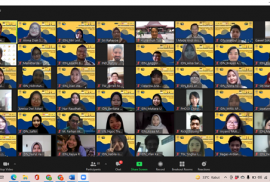
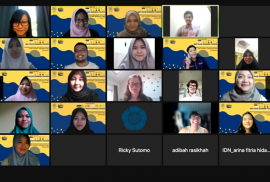
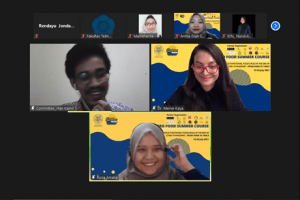 The first session was about “Functional Foods Marketing and Management” which was delivered by Dr. Merve Kaya. The main topic Dr. Merve Kaya discusses is Microalgae. Currently, microalgae are used in agriculture, aquaculture, human nutrition, animal nutrition, and cosmetics. In the future, microalgae might be used for pharmaceuticals, biomaterials, and biofuels. In addition, Microalgae have benefits in many fields such as a plant-based source with eco-friendly extraction, organic base macronutrients, and complete amino acid, and metabolic profiles with free L-amino acids. Other than that the benefits of microalgae were improving crop vigor, creating healthier plants, advancing flowering and seed/fruit development, and increasing the tolerance to abiotic stress. Hence, it is possible to create new agricultural solutions and a sustainable farming environment using microalgae products.
The first session was about “Functional Foods Marketing and Management” which was delivered by Dr. Merve Kaya. The main topic Dr. Merve Kaya discusses is Microalgae. Currently, microalgae are used in agriculture, aquaculture, human nutrition, animal nutrition, and cosmetics. In the future, microalgae might be used for pharmaceuticals, biomaterials, and biofuels. In addition, Microalgae have benefits in many fields such as a plant-based source with eco-friendly extraction, organic base macronutrients, and complete amino acid, and metabolic profiles with free L-amino acids. Other than that the benefits of microalgae were improving crop vigor, creating healthier plants, advancing flowering and seed/fruit development, and increasing the tolerance to abiotic stress. Hence, it is possible to create new agricultural solutions and a sustainable farming environment using microalgae products. In addition, the second session was about “Supply Chain Management in Functional Food Industry” by Prof. Kune-muh Tsai. He opened the discussion with the definition of the supply chain. Other than that, Prof. Kune-muh Tsai gave an example where the functional food industry in Taiwan is mainly distributed across the midstream and the downstream. Next, Prof. Kune-muh Tsai also talked about the functional food supply chain, the differentiation between supply chains of functional food in Taiwan and Brazil, the example of the yogurt supply chain in China, supply chain of challenges of functional food due to trade war and pandemic, cold chain practice (best practice), and international supply chain also explained. Moreover, Prof. Kune-muh Tsai also explained how to control the supply chain risk.
In addition, the second session was about “Supply Chain Management in Functional Food Industry” by Prof. Kune-muh Tsai. He opened the discussion with the definition of the supply chain. Other than that, Prof. Kune-muh Tsai gave an example where the functional food industry in Taiwan is mainly distributed across the midstream and the downstream. Next, Prof. Kune-muh Tsai also talked about the functional food supply chain, the differentiation between supply chains of functional food in Taiwan and Brazil, the example of the yogurt supply chain in China, supply chain of challenges of functional food due to trade war and pandemic, cold chain practice (best practice), and international supply chain also explained. Moreover, Prof. Kune-muh Tsai also explained how to control the supply chain risk.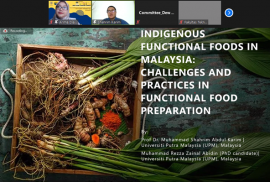
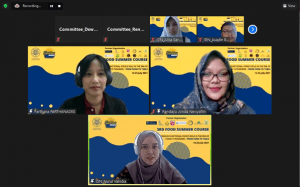 In the second session, the lecture was delivered by Assoc. Prof. Dr. Parthana Parthanadee about “Supply Chain and Logistics Analysis of Functional Foods Industry”. This session was led by Rendayu Jonda Neisyafitri, S.T.P., M.Sc. Prof. Parthana explained the drivers of supply chain and metrics in terms of responsiveness and efficiency, types of facilities, components of facilities, the role of facilities, inventory, transportation, data and analysis, price and the supply chain. The main process of supply chain includes planning, source and resources, create, deliver and returns. In addition, the supply chain operations structure consists of four major sections including performance, processes, practices, and people. By the end of his lecture, Prof. Parthana described the characteristics of agri-food supply chains that need to be taken into deliberate consideration when evaluating the resilience, including biological processes, perishability, structure, necessity, and system’s perspective.
In the second session, the lecture was delivered by Assoc. Prof. Dr. Parthana Parthanadee about “Supply Chain and Logistics Analysis of Functional Foods Industry”. This session was led by Rendayu Jonda Neisyafitri, S.T.P., M.Sc. Prof. Parthana explained the drivers of supply chain and metrics in terms of responsiveness and efficiency, types of facilities, components of facilities, the role of facilities, inventory, transportation, data and analysis, price and the supply chain. The main process of supply chain includes planning, source and resources, create, deliver and returns. In addition, the supply chain operations structure consists of four major sections including performance, processes, practices, and people. By the end of his lecture, Prof. Parthana described the characteristics of agri-food supply chains that need to be taken into deliberate consideration when evaluating the resilience, including biological processes, perishability, structure, necessity, and system’s perspective.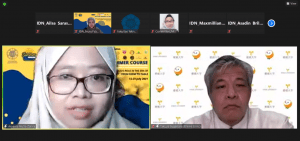 In the third session, the Prof. Takuya Sugahara shared the critical concept and idea about “Functional Foods In Japan: Regulation And Effects On Health”. This session was led by Aryanis Mutia Zahra, S.TP., M.Si. In the beginning of the lecture, Prof. Sugahara brought all the participants to the introduction of Ehime University at glance as he is affiliated at Ehime University. Subsequently, Prof. Sugahara divided his lecture into 3 sub-themes including Functional Food System in Japan, Evaluation of Food Functions, and Health Function of Spice. In Japan, food products were categorized into four groups, which comprise of food in general, foods with health claims, pharmaceutical products, and quasi-pharmaceutical products. In addition, Prof. Sugahara explained the various categories of food functions. In the other hand, Prof Sugahara emphasized that the critical concept of food with health claims is healthy foods that meet standards determined by the government and regulation. In terms of the regulation, functional food is divided into three main categories which include Food with Nutrient Function Claim (FNFC), Food for specified health use (FOSHU) and food with Function Claims (FFC). Food with Nutrient Function Claim (FNFC) is food that is characterized by the role vitamins and minerals added in the food. Food for Specified Health Use (FOSHU) is food that is scientifically recognized for its beneficial health impact, while Food with Function Claims (FFC) is a food which can be indicated with a function claim based on scientific evidence under the supplier’s responsibility.
In the third session, the Prof. Takuya Sugahara shared the critical concept and idea about “Functional Foods In Japan: Regulation And Effects On Health”. This session was led by Aryanis Mutia Zahra, S.TP., M.Si. In the beginning of the lecture, Prof. Sugahara brought all the participants to the introduction of Ehime University at glance as he is affiliated at Ehime University. Subsequently, Prof. Sugahara divided his lecture into 3 sub-themes including Functional Food System in Japan, Evaluation of Food Functions, and Health Function of Spice. In Japan, food products were categorized into four groups, which comprise of food in general, foods with health claims, pharmaceutical products, and quasi-pharmaceutical products. In addition, Prof. Sugahara explained the various categories of food functions. In the other hand, Prof Sugahara emphasized that the critical concept of food with health claims is healthy foods that meet standards determined by the government and regulation. In terms of the regulation, functional food is divided into three main categories which include Food with Nutrient Function Claim (FNFC), Food for specified health use (FOSHU) and food with Function Claims (FFC). Food with Nutrient Function Claim (FNFC) is food that is characterized by the role vitamins and minerals added in the food. Food for Specified Health Use (FOSHU) is food that is scientifically recognized for its beneficial health impact, while Food with Function Claims (FFC) is a food which can be indicated with a function claim based on scientific evidence under the supplier’s responsibility.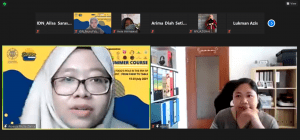 Moving on to the last session, the lecture was delivered by Dr. Realm Kohler geb. Alis about “Indigenous Functional Foods in the Philippines”. This session was led by Aryanis Mutia Zahra, S.TP., M.Si. Dr. Realm opened the lecture by sharing some data about the current health and nutrition in ASEAN. Then she explained about dietary diversification which defined the significance that diet must include sufficient quantity and variety of good quality of food that will cover most of the essential nutrients needed by the body. Southeast Asia (SEA) is considered as the food bowl of Asia which reflected by its huge biodiversity. In addition, Philippines is one of the 17 mega diversity countries in the world. Despite of its resource’s potency, Philippines has no specific regulations for functional foods. In general, some functional foods in Philippines are derived from its diversity of genetical natural resources, such as pigmented rice (brown rice), mangosteen, malunggay, turmeric, coffee, and fish.
Moving on to the last session, the lecture was delivered by Dr. Realm Kohler geb. Alis about “Indigenous Functional Foods in the Philippines”. This session was led by Aryanis Mutia Zahra, S.TP., M.Si. Dr. Realm opened the lecture by sharing some data about the current health and nutrition in ASEAN. Then she explained about dietary diversification which defined the significance that diet must include sufficient quantity and variety of good quality of food that will cover most of the essential nutrients needed by the body. Southeast Asia (SEA) is considered as the food bowl of Asia which reflected by its huge biodiversity. In addition, Philippines is one of the 17 mega diversity countries in the world. Despite of its resource’s potency, Philippines has no specific regulations for functional foods. In general, some functional foods in Philippines are derived from its diversity of genetical natural resources, such as pigmented rice (brown rice), mangosteen, malunggay, turmeric, coffee, and fish.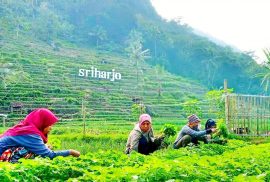
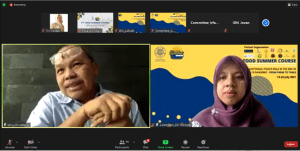 In the second session, the lecture was delivered by Prof. Lilik Sutiarso about “Sustainable Agriculture: a case study in Sriharjo Village”. In his lecture, Prof. Lilik explained about the concept of the bio-circular-green (BCG) economy. The concepts of circular economy, green economy, and bio-economy are joined by the common ideal to reconcile economic, environmental, and social goals. It is a concept that has been developed for a long time. The concept integrates economic, social, and environmental. This concept will provide opportunities including industry, government, and private systems to work together in an interconnected system.
In the second session, the lecture was delivered by Prof. Lilik Sutiarso about “Sustainable Agriculture: a case study in Sriharjo Village”. In his lecture, Prof. Lilik explained about the concept of the bio-circular-green (BCG) economy. The concepts of circular economy, green economy, and bio-economy are joined by the common ideal to reconcile economic, environmental, and social goals. It is a concept that has been developed for a long time. The concept integrates economic, social, and environmental. This concept will provide opportunities including industry, government, and private systems to work together in an interconnected system.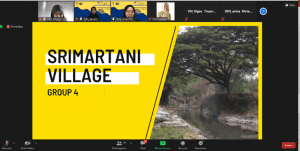 Therefore, the last session was the group presentation based on the results of the brainstorming about the advantages and disadvantages of implementing Agro-ecotourism and the utilization of agricultural machinery of the video that has been conducted in the morning session. This session was guided by Dr. Ngadisih to guide the participant’s group presenting their group discussion regarding the assigned topic by the committee.
Therefore, the last session was the group presentation based on the results of the brainstorming about the advantages and disadvantages of implementing Agro-ecotourism and the utilization of agricultural machinery of the video that has been conducted in the morning session. This session was guided by Dr. Ngadisih to guide the participant’s group presenting their group discussion regarding the assigned topic by the committee.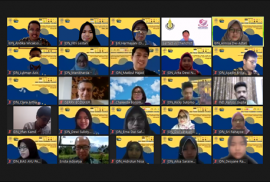
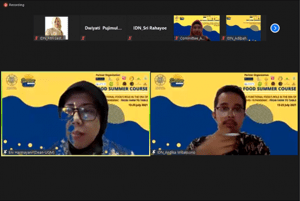 After the opening ceremony continued with 3 sessions of material delivered by Prof. Eni Harmayani, Prof. Unnikhrisnan, and Prof. Gerard Bodeker. The first session was delivered by Prof. Dr. Eni Harmayani, the Dean of Faculty of Agricultural Technology UGM with the topic “Functional Food Development of Local Resources”. In this section, Prof. Eni described the definition of functional food, why are foods called functional food, and functional food from Indonesia. Many local resources can be developed into functional food, such as Glucomannan from Porang, Mocaf from Cassava flour, sweet potato fiber, and Arrowroot flour. Indonesia also has Jamu (Indonesian herbal medicine) and Spices in Indonesia as a functional food.
After the opening ceremony continued with 3 sessions of material delivered by Prof. Eni Harmayani, Prof. Unnikhrisnan, and Prof. Gerard Bodeker. The first session was delivered by Prof. Dr. Eni Harmayani, the Dean of Faculty of Agricultural Technology UGM with the topic “Functional Food Development of Local Resources”. In this section, Prof. Eni described the definition of functional food, why are foods called functional food, and functional food from Indonesia. Many local resources can be developed into functional food, such as Glucomannan from Porang, Mocaf from Cassava flour, sweet potato fiber, and Arrowroot flour. Indonesia also has Jamu (Indonesian herbal medicine) and Spices in Indonesia as a functional food.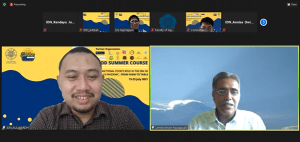 In addition, the second session was given by Prof. Unnikhrisnan Payyapallimanna about Indigenous Food Systems in Promotion of Health – An Ayurvedic (Indian) Perspective. Prof. Unnikhrisnan discussed the sustainability challenges of non-communicable, lifestyle diseases, and malnutrition, links between Biodiversity, Nutrition, and Health and the role of traditional knowledge, and elaborated the traditional food systems, their significance in health and nutrition: An Ayurveda perspective. Other than that, Prof. Unnikhrisnan emphasized that “Diversity enriches the quality of life in health, sensory, social, intellectual, and moral terms and increases options and resilience for building livelihoods in the short term and for the future.”
In addition, the second session was given by Prof. Unnikhrisnan Payyapallimanna about Indigenous Food Systems in Promotion of Health – An Ayurvedic (Indian) Perspective. Prof. Unnikhrisnan discussed the sustainability challenges of non-communicable, lifestyle diseases, and malnutrition, links between Biodiversity, Nutrition, and Health and the role of traditional knowledge, and elaborated the traditional food systems, their significance in health and nutrition: An Ayurveda perspective. Other than that, Prof. Unnikhrisnan emphasized that “Diversity enriches the quality of life in health, sensory, social, intellectual, and moral terms and increases options and resilience for building livelihoods in the short term and for the future.”